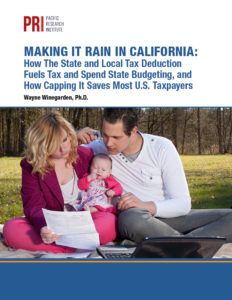 A new study released today by the nonpartisan Pacific Research Institute, a California-based free market think tank, found that capping the State and Local Tax deduction brought broad-based tax relief to millions of Americans, while putting an end to taxpayers in low-tax states like Indiana subsidizing higher taxes and spending in states like California.
A new study released today by the nonpartisan Pacific Research Institute, a California-based free market think tank, found that capping the State and Local Tax deduction brought broad-based tax relief to millions of Americans, while putting an end to taxpayers in low-tax states like Indiana subsidizing higher taxes and spending in states like California.
Click here to download a copy of “Making it Rain in California”
“Congress didn’t increase California’s tax burden – Sacramento politicians did. The State and Local Tax deduction encourages California to tax and spend more, subsidized by low-tax states. When Congress capped this special-interest tax break, millions received tax relief. Now Californians knows how much Sacramento’s overspending really costs them,” said Winegarden.
The 2017 federal Tax Cut and Jobs Act reformed federal personal and corporate tax codes, including capping the State and Local Tax (SALT) deduction at $10,000.
“Making it Rain in California” found that the Act helped reduce the wealth transfer from taxpayers in low-tax states to high-income taxpayers in high-tax states, while improving tax code competitiveness. The study quantifies average and marginal tax rates for taxpayers (married, filing jointly) at five income levels ($50,000, $100,000, $200,000, $500,000, $1.5 million) using California (high-tax state) and Indiana (low-tax state) as proxies.
Among its findings:
• Average tax rates on high-income taxpayers from high-tax states declined for all hypothetical couples except those earning $1.5 million but helped enable lower personal income taxes for nearly everyone else.
• Married taxpayers filing jointly with an income of $200,000 living in California saw their average tax rate decline by 10.3% and their marginal tax rate fall by 4.0% while Indianans saw their tax rates drop by 13.4% and 12.5% respectively.
• The reduction means that the SALT cap enabled $651.5 billion of special-interest state tax breaks to be reallocated into broad-based marginal tax rate reductions.
Several measures have been introduced to repeal or modify the cap. H.R. 1757 would raise it to $15,000 for individuals, $30,000 for married couples filing jointly, and adjust annually for inflation. H.R. 1142 would repeal the cap and raise the top tax bracket to 39.6%.
“Some want to reverse this cap and force low tax states to again pay for big spending in California, New York, and Illinois. That would be a mistake,” said Winegarden. “Taxpayers in high-tax states should demand that lawmakers reform anti-growth state tax codes and cut spending to make their economies more competitive.”
Dr. Wayne Winegarden is Senior Fellow in Business and Economics at the Pacific Research Institute and director of PRI’s Center for Medical Economics and Innovation. He is also the Principal of Capitol Economic Advisors.

